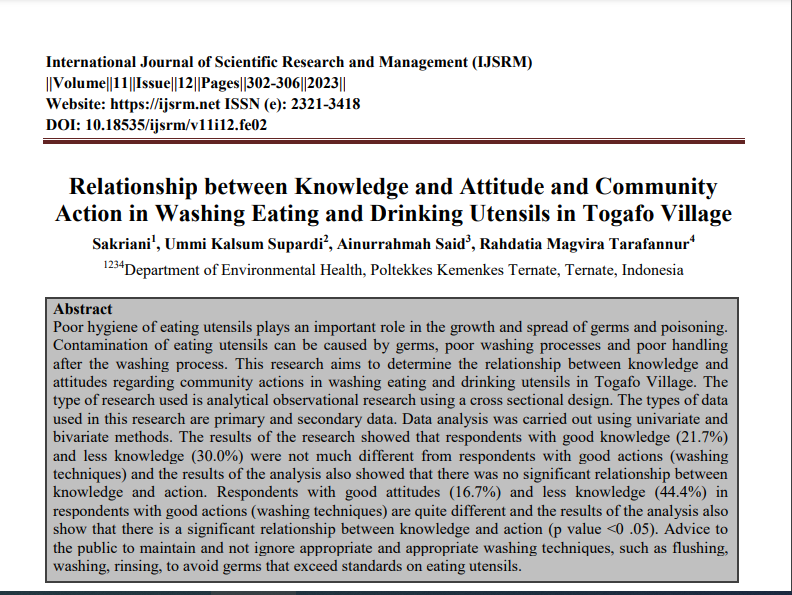Relationship between Knowledge and Attitude and Community Action in Washing Eating and Drinking Utensils in Togafo Village

Submission to VIJ 2023-12-07
Keywords
- Cutlery,
- knowledge,
- attitude,
- Washing
Copyright (c) 2023 Sakriani, Ummi Kalsum Supardi Nurlaeli, Ainurrahmah Said, Rahdatia Magvira Tarafannur Hartati

This work is licensed under a Creative Commons Attribution 4.0 International License.
Abstract
Poor hygiene of eating utensils plays an important role in the growth and spread of germs and poisoning. Contamination of eating utensils can be caused by germs, poor washing processes and poor handling after the washing process. This research aims to determine the relationship between knowledge and attitudes regarding community actions in washing eating and drinking utensils in Togafo Village. The type of research used is analytical observational research using a cross sectional design. The types of data used in this research are primary and secondary data. Data analysis was carried out using univariate and bivariate methods. The results of the research showed that respondents with good knowledge (21.7%) and less knowledge (30.0%) were not much different from respondents with good actions (washing techniques) and the results of the analysis also showed that there was no significant relationship between knowledge and action. Respondents with good attitudes (16.7%) and less knowledge (44.4%) in respondents with good actions (washing techniques) are quite different and the results of the analysis also show that there is a significant relationship between knowledge and action (p value <0 .05). Advice to the public to maintain and not ignore appropriate and appropriate washing techniques, such as flushing, washing, rinsing, to avoid germs that exceed standards on eating utensils.
References
- National Council of Education Educational Research and Training. Food Quality and Food Safety. In: Human Ecology and Family Sciences. Fifth. New Delhi; 2022. p. 115–38.
- Rhomadhoni MN, Firdausi NJ, Herdiani N. Trends in the incidence of food poisoning in various regions in Indonesia in 2014 and 2015. Med Technol Public Heal J. 2018;2(1):51–65.
- Pama R. Design of an Information System for Response to an Outbreak of Food Poisoning at the Yogyakarta Center for Environmental Health Engineering and Disease Control, Pama Rahmadewi. J Medical Records and Health Inf. 2022;1(1):13–22.
- Food and Drug Supervisory Agency. Annual Report of the Food and Drug Supervisory Agency in Sofifi. Sofifi; 2022.
- Sakriani. Food and Drink Health. First. Ruhardi A, editor. Tasikmalaya; 2021.
- Marisdayana R, Harahap PS, Yosefin H. Cutlery Washing Techniques, Personal Hygiene Against Bacterial Contamination of Cutlery. J Endur. 2017;2(3):376–82.
- Azari JT. Comparative Study of Washing Cutlery by Soaking and Running Water on the Number of Germs on Cutlery at the Bu Am Gonilan Food Stall. Muhammadiyah Surakarta university; 2013.
- Sinaga E. Personal Hygiene, Washing Eating Utensils and Amount of Eating Utensils Bacteria At the Food Sellers Center in Kampung Solor, Kupang. J Health Info. 2013;11(1):372–80.
- Trisnajati U, Rahayuni A, Noviardhi A, Setiadi Y, Tursilowati S. Knowledge and Practice of Serving Utensil Washing Personnel and Identifying the Presence of Escherichia coli Bacteria on Tableware at the KMRT Wongsonegoro Regional General Hospital (RSUD) Semarang. Ris Gizi. 2018;6(1):67–73.
- Mullan B, Wong C, Todd J, Davis E, Kothe EJ. Food hygiene knowledge in adolescents and young adults. Br Food J. 2015 Jan;117(1):50–61.
- Malhotra N, Shankar R, Pal A, Ahmed S, Taneja N, Anant Awasth A, et al. A Study on Knowledge, Attitude and Practice on Food Safety & Hygiene among the Students of a Private University of Delhi, NCR. J Nutr Heal Food Sci. 2020;8(2):1–7.
- Tuglo LS, Agordoh PD, Tekpor D, Pan Z, Agbanyo G, Chu M. Food Safety Knowledge, Attitude, and Hygiene Practices of Street-cooked Food Handlers in North Dayi District, Ghana. Environ Health Prev Med. 2021;26(1):1–13.
- Jores D, Arif MT, Rahman MM. Factors Associated with Food Hygiene Practices Among Street Food Vendors in Padawan, Sarawak. Borneo J Resour Sci Technol. 2018;8(1):56–65.
- Saipullizan SNA, Mutalib SA, Sedek R. Knowledge, Attitude and Practice of Food Utensils Hygiene Amongst Food Handlers in Kuala Pilah, Negeri Sembilan, Malaysia. Science Malaysiana. 2018;47(7):1527–33.
- Taarelluan KT, Ottay RI, Pangemanan JM. Relationship between Knowledge and Community Attitudes towards Preventive Measures for Acute Respiratory Infections (ARI) in Tataaran 1 Village, South Tondano District, Minahasa Regency. J Community Cover And Trop. 2016;4(1).
- Mohd Shahid NS, Abdul Wahab RA, Rajan S, SM NA. Cutting Board Hygiene Knowledge, Attitudes and Practices of Food Handlers at Home during Covid19Pandemic in Selangor. In: Environment-Behavior Proceedings Journal. e-IPH Ltd.; 2022. p. 225–32.